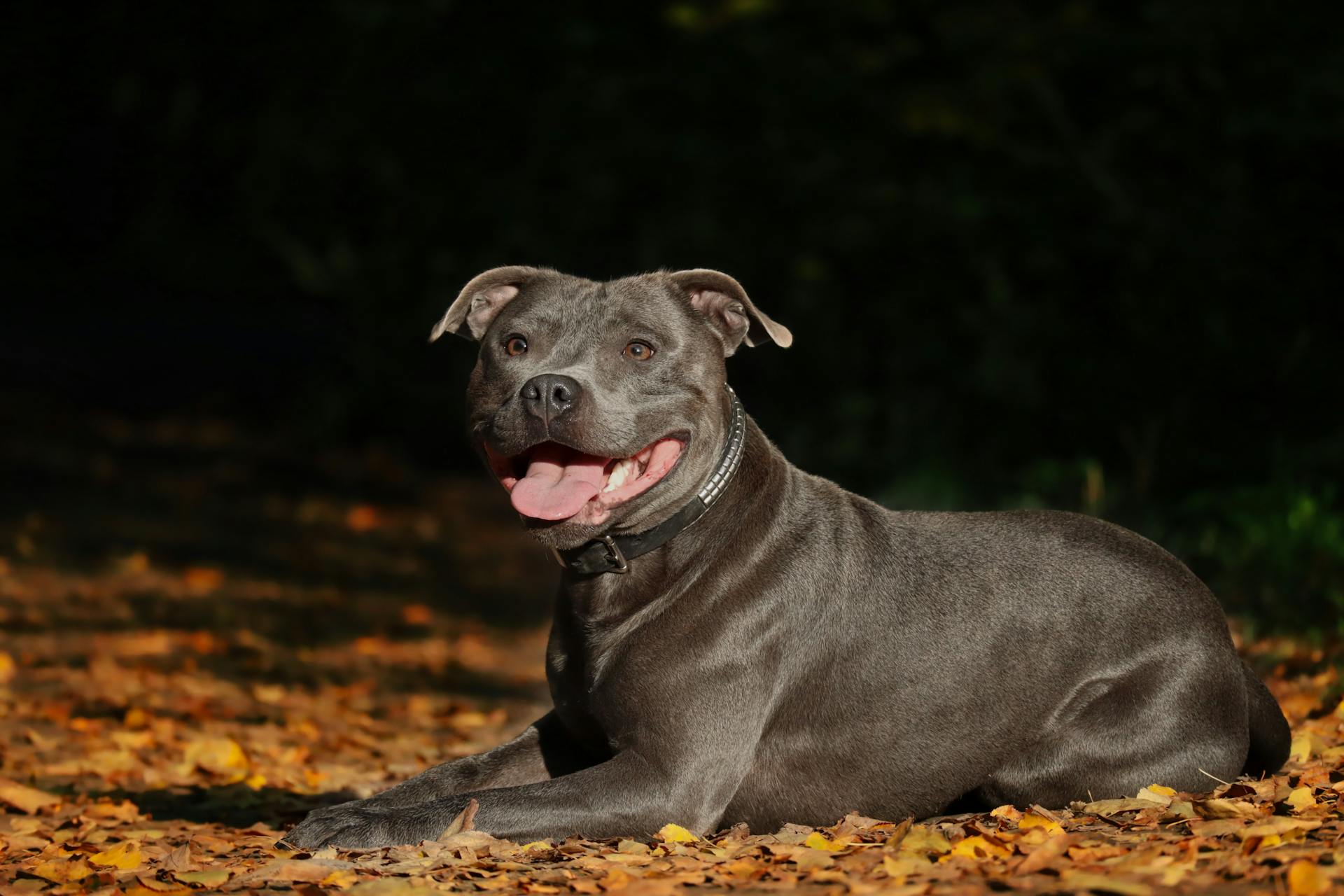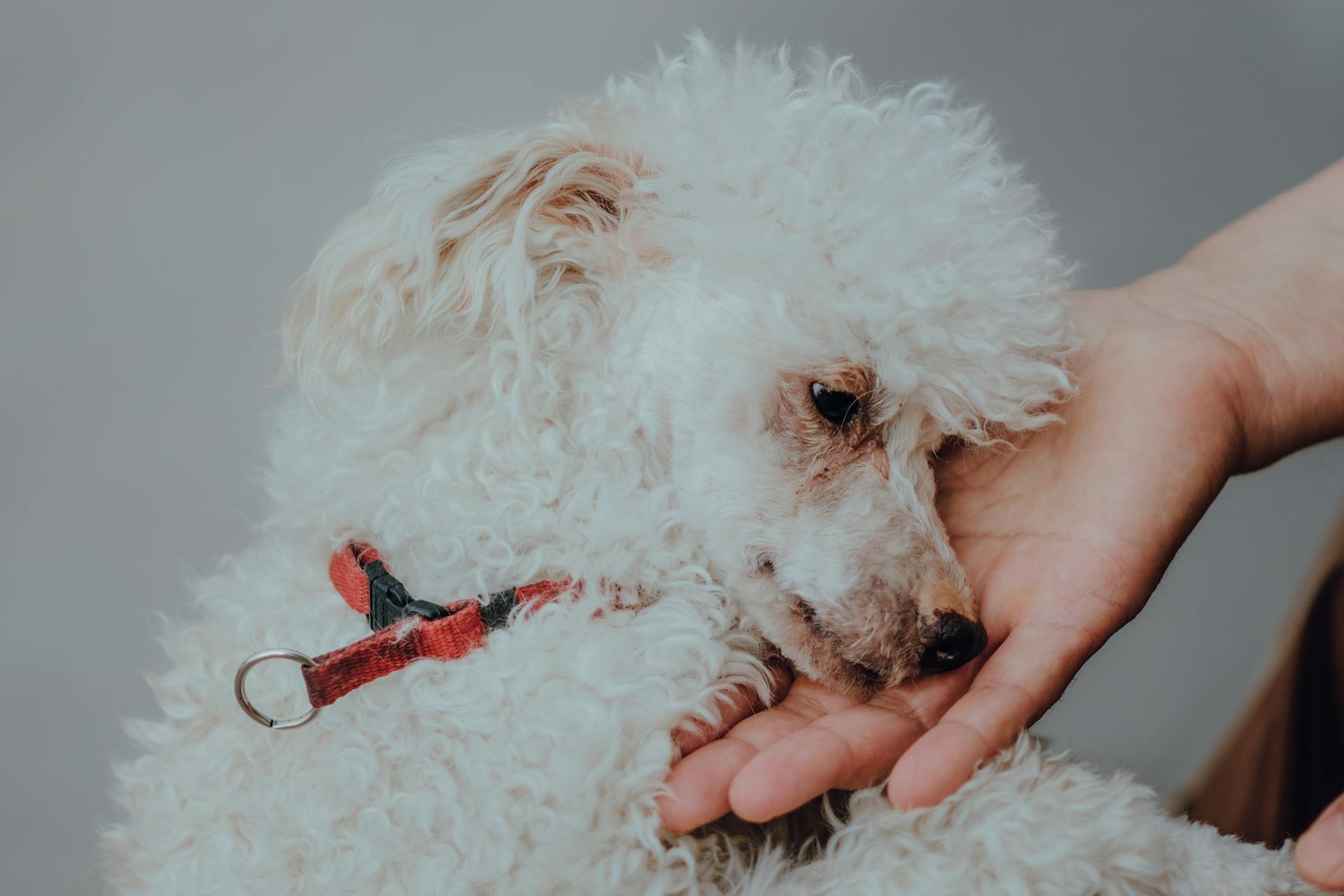
Yorkshire Terriers are prone to skin problems, and as a responsible dog owner, it's essential to understand the causes and take preventative measures.
Regular grooming is crucial to prevent skin problems in Yorkies.
Yorkies are prone to skin fold dermatitis, a condition that occurs when skin folds trap moisture and bacteria, leading to infections. This can be prevented by ensuring the skin folds are kept clean and dry.
Skin allergies are another common issue in Yorkies, often caused by environmental allergens such as pollen or dust mites.
Yorkies can also suffer from atopy, a genetic predisposition to skin allergies.
Additional reading: Skin Problems
Causes of Yorkshire Terrier Skin Problems
Yorkshire Terriers can be prone to various skin problems, and understanding the causes can help you provide the best care for your furry friend.
Genetics play a significant role in the development of Black Skin Disease, a condition that can cause skin discoloration in Yorkies. This condition is often seen in breeds like Chow Chows, Pomeranians, Huskies, and Toy Poodles, including Yorkies.
Allergies can also cause skin issues in Yorkies, including skin inflammation and discoloration. Food, environmental factors, or parasites like fleas can trigger allergic reactions, making skin conditions more difficult to manage.
Hormonal imbalances, particularly involving the adrenal and thyroid glands, can disrupt normal skin and coat health, leading to hair loss and skin pigmentation changes.
Flea allergies are a common cause of skin allergies in Yorkies, as fleas can easily get into their long coat and cause problems. Even a single flea bite can trigger an adverse reaction.
Here are some common causes of skin problems in Yorkies:
- Genetics
- Allergies (food, environmental, or parasites)
- Hormonal imbalances
- Flea allergies
Due to Genetics
Genetics can play a significant role in the development of Black Skin Disease in Yorkies. This condition is often seen in breeds such as Chow Chows, Pomeranians, Huskies, and Toy Poodles, and Yorkies are also predisposed to it due to their genetic makeup.
If your Yorkie has a family history of skin problems, they may be more susceptible to Black Skin Disease. This is why it's essential to carefully choose puppies and discover everything about your dog's health history.
You might like: Where Are Yorkshire Terriers from
Some breeds are more prone to skin problems due to their genetic makeup, including Yorkies. This is a crucial consideration when bringing a new puppy home.
Meeting the parents of your puppy can give you valuable insight into their potential health risks. This is especially important if you're considering a breed that's prone to skin problems like Black Skin Disease.
Due to Hormonal Imbalances
Hormonal imbalances can cause skin problems in Yorkshire Terriers. This is often due to issues with the adrenal and thyroid glands.
Hormonal imbalances can disrupt normal skin and coat health, leading to hair loss and skin pigmentation changes. Unfortunately, this can result in permanent black spots on the skin.
Yorkshire Terriers with hormonal imbalances may require hormonal treatments to correct the issues. These medications can help restore balance and improve skin and coat health.
Hormonal treatments can be prescribed by a veterinarian to address hormonal imbalances in Yorkshire Terriers.
Consider reading: Yorkie Terrier Health Issues
Regular Grooming
Regular grooming is essential for maintaining your Yorkie's skin health. Brushing their coat helps remove dead hair and skin cells, preventing matting and reducing the risk of infections.
Grooming also allows you to monitor your Yorkie's skin condition and catch any issues early. If your Yorkie's skin is painful in touch, then you should stop using a Yorkie brush with metal pins.
To prevent the buildup of dirt and debris, groom your dog regularly. This includes keeping facial skin folds clean in breeds with folds.
Here are some tips for regular grooming:
- Brush your Yorkie's coat regularly to remove dead hair and skin cells
- Check for matting and tangles, and gently work them out with a detangling spray
- Monitor your Yorkie's skin condition and catch any issues early
Symptoms of Skin Problems
Yorkshire terriers with skin problems may experience itching and discomfort, leading to excessive scratching or licking of the affected areas.
Itching can be a significant issue for Yorkies, causing them to scratch or lick their skin excessively.
Some common symptoms of skin problems in Yorkies include itchiness, dandruff, and flaking skin.
In severe cases, skin problems can lead to hair loss and inflammation.
Here are some common symptoms of skin problems in dogs, which may also affect Yorkies:
- itchiness
- dandruff
- flaking
- pimples
- scaling
- hair loss
- inflammation
- odor
- increased oiliness
- scabs
Treatment and Management
Hormonal imbalances can be addressed with prescribed medications to restore balance and improve skin and coat health.
Your veterinarian may recommend hypoallergenic diets, supplements, or medications to help control allergic reactions in Yorkies.
Managing allergies is crucial in treating skin problems, so identifying and eliminating allergens from your Yorkie's environment is essential.
Topical treatments such as medicated shampoos, ointments, and sprays can help soothe and heal affected skin, reducing inflammation and promoting healthy skin regeneration.
To provide relief from itchiness, an oatmeal bath can be prepared by mixing 50% oat powder with 50% water and applying it to your dog's skin for 10 minutes.
Regular brushing, especially for long and full coats, allows for skin examination and early detection of potential issues, such as fleas.
Hormonal Treatments
If hormonal imbalances are identified, your veterinarian may prescribe medications to correct these issues.
Hormonal treatments can help restore balance and improve skin and coat health.
In some cases, hormonal imbalances involving the adrenal and thyroid glands are implicated in skin problems.
Hormonal imbalances can disrupt normal skin and coat health, leading to hair loss and skin pigmentation changes.
Topical Treatments
Topical treatments can be a great way to soothe and heal your Yorkie's skin.
Medicated shampoos, ointments, and sprays are effective in reducing inflammation and fighting infections.
Preparing an oatmeal bath is a good option for itchy skin, as it releases itchiness and provides a nourishing effect. To do this, mix 50% oat powder with 50% water and apply it to your dog's skin for 10 minutes.
This treatment can be a bit messy, so it's best to perform it in a bathtub to avoid making a mess.
Nutritional Support
A balanced diet rich in essential fatty acids, vitamins, and minerals is vital for maintaining healthy skin and coat.
Your veterinarian may recommend dietary supplements to support your Yorkie's skin health. A balanced diet can also help reduce the risk of allergies and skin problems.
Identifying the right food for your Yorkie is crucial, and your vet can help you make an informed decision.
Intriguing read: Yorkshire Terrier for Adoption
Allergies and Skin Issues
Yorkshire terriers can be prone to skin issues due to allergies, which can be caused by a variety of factors, including food, environmental factors, and parasites like fleas. Allergies can lead to skin inflammation and discoloration, making them more difficult to manage.
Managing allergies is crucial in treating skin problems in Yorkies. Your veterinarian may recommend hypoallergenic diets, supplements, or medications to help control allergic reactions. Identifying and eliminating allergens from your Yorkie's environment is also essential.
Dogs get allergies just like people do. Food allergies, environmental allergies, and seasonal allergies can cause a host of symptoms in dogs, including dry skin. If left untreated, these allergies can result in a skin condition called atopic dermatitis, which causes dry skin, itching, redness, and inflammation.
Flea allergy dermatitis is the most common skin disorder in American dogs. The best way to avoid flea allergy dermatitis is to keep your dog and home free of fleas and to talk to your veterinarian about treatment options for your dog's allergies.
Readers also liked: How to Draw a Yorkshire Terrier Dog
Dry skin is a symptom associated with a wide range of conditions, from allergies and parasites to serious medical disorders like Cushing's disease and hypothyroidism.
Here are some common causes of skin allergies in Yorkies:
- Fleas
- Dust
- Mold
- Food allergies
- Preservatives and food colorants
To maintain your Yorkie's coat and skin health, a nutritionally adequate diet is very important. For dogs, a very important part of their health is vitamins for skin, especially vitamin E. Vitamin E deficiency can cause hair loss and skin issues such as infections.
Some helpful ingredients to fight allergies in Yorkies include:
- Vitamin E
- Omega fatty oils
- Fish oil
- Probiotics
- Coconut oil
By incorporating these ingredients into your Yorkie's diet and using products that are free from colorants and harsh chemicals, you can help to improve their skin's condition and prevent further irritations.
Dry Skin and Skin Problems
Dry skin can be a sign of a much larger problem in your Yorkie, such as allergies, parasites, or serious medical disorders like Cushing's disease and hypothyroidism.
Dry skin is a common issue in dogs, and it can be caused by various factors, including environmental conditions, improper or excessive bathing, harsh soaps, and poor nutrition.
Some breeds are more prone to dry skin than others, but regular grooming can help prevent the buildup of dirt and debris, reducing the risk of dry skin.
Symptoms of dry skin in dogs include itchiness, dandruff, flaking, pimples, scaling, hair loss, inflammation, odor, increased oiliness, and scabs.
Dry skin can be treated with a combination of treatments, depending on the cause. If it's caused by allergies, your vet may prescribe an elimination diet or recommend a specific shampoo. If it's caused by environmental conditions, using a humidifier and reducing the frequency of baths can help.
Some common causes of skin allergies in Yorkies include flea allergies, dust, mold, and certain foods. Fleas can easily get into a Yorkie's coat and cause problems, so it's essential to keep them under control.
Here are some common dietary skin allergens that can affect Yorkies:
- Beef
- Soy
- Corn
- Wheat
- Dairy
- Chicken
- Eggs
To prevent dry skin and skin problems in your Yorkie, it's essential to feed a high-quality, balanced diet from puppyhood, prevent parasites, and groom your dog regularly. Regular veterinary checkups can also help monitor your dog's overall health and catch any skin issues early on.
Take a look at this: Yorkshire Terrier Dog Names Female
Parasites and Infections
Parasites and infections can be a common cause of skin problems in Yorkshire Terriers. Dry, flaky skin can be a sign of parasites that cause mange, such as the Demodex mite, canine scabies, and cheyletiellosis (Walking Dandruff), or it could indicate that your dog has lice.
Diagnosing parasites requires a trip to the veterinarian, who may refer you to a specialist in veterinary dermatology if needed. A foul odor from the affected skin can be a sign of secondary infections that occur when the skin's natural barrier is compromised.
Bacterial and fungal infections can cause skin-related symptoms in dogs, and veterinarians usually diagnose them by taking skin scrapes for cytology. Some infections, such as the fungal infection Ringworm, are also transmissible to humans.
Infections
Infections can be a serious issue for dogs, and it's essential to take them seriously. Bacterial and fungal infections can cause a variety of skin-related symptoms in dogs.
Here's an interesting read: Are American Staffordshire Terriers Good Dogs
Some infections, such as the fungal infection Ringworm, are transmissible to humans. This means you could potentially catch it from your furry friend if you're not careful.
Veterinarians usually diagnose canine skin infections by taking skin scrapes for cytology. This is a simple and effective way to determine what's causing the infection.
Dry skin should always be taken seriously, as it can be a sign of a larger problem. This is because a compromised skin barrier can lead to secondary infections.
Parasites
Parasites can be a sneaky cause of dry skin on dogs, often going unnoticed until symptoms appear.
Dry, flaky skin can be a sign of parasites that cause mange, such as the Demodex mite, canine scabies, and cheyletiellosis (Walking Dandruff).
Diagnosing parasites that cause dry skin on dogs requires a trip to the veterinarian, who may refer you to a specialist in veterinary dermatology if needed.
Systemic Disorders
Systemic Disorders can be a serious underlying issue in dogs with dry skin. Cushing's disease and hypothyroidism are two metabolic diseases that can cause dry skin, along with other symptoms like dry and brittle hair, hair loss, and skin infections.

Dogs with Cushing's disease often experience dry skin, which can be accompanied by other symptoms like excessive thirst and urination. Hypothyroidism, on the other hand, can cause dry skin, hair loss, and weight gain.
Auto-immune diseases and cancer can also cause dry skin in dogs, making it essential to rule out these underlying conditions if your dog is experiencing persistent skin issues.
Here are the three common treatment options for allergies in dogs:
- Avoidance of the allergen
- Controlling the symptoms (itching, dry skin, etc.)
- Immunotherapy options, such as allergy shots
Frequently Asked Questions
Why does my Yorkie have little bumps on skin?
Little bumps on your Yorkie's skin could be caused by external parasites, allergies, or infections, such as mites, fleas, or an allergic reaction. Check for seborrhea, a common skin condition, especially on the back
What do allergy bumps look like on dogs?
Allergy bumps on dogs are typically small, raised bumps (less than 1 cm in diameter) and can also appear as larger, itchy hives.
Sources
- https://yorkies-gram.com/why-is-my-yorkies-skin-turning-black/
- https://www.akc.org/expert-advice/health/dry-skin-on-dogs/
- https://nativepet.com/blogs/health/are-yorkies-hypoallergenic
- https://www.dummies.com/article/home-auto-hobbies/pets/dogs/breeds/terriers/recognizing-common-health-issues-in-yorkshire-terriers-195948/
- https://yorkies-gram.com/your-guide-to-yorkie-skin-problems/
Featured Images: pexels.com


